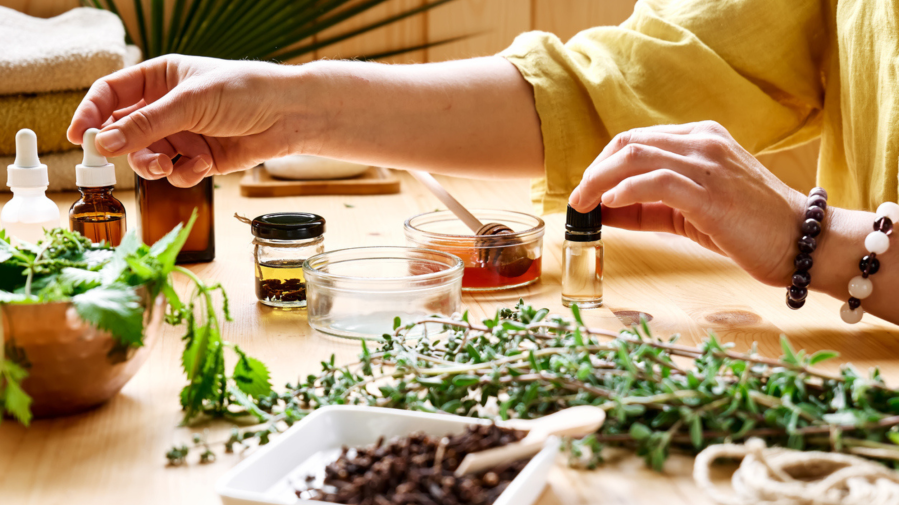
While many people opt for a prescription medicine to ease the pain of acute or chronic headaches, there are several more natural strategies to try that may also ease your tension. These methods can help stave off a pounding headache before the symptoms start, and they can also reduce the length of time you’re feeling discomfort after a headache has started.
Although natural headache relief methods aren’t effective 100% of the time, according to neurologist Romie Mushtaq, MD, these natural methods are worth trying before you proceed to prescription interventions. Read on to learn several methods for relieving headaches that don’t require medication.
Types of Headaches and How to Relieve Them
Tension headaches are the most common type of headache. They involve painful pressure in your head and neck. The pain from tension headaches occurs due to muscle contractions in your neck, jaw and lower skull muscles, and the headaches themselves can present differently in different individuals. For many people, the pain begins in the forehead and radiates to the top of the head and back of the neck.
Tension headaches usually last no more than 24 hours, but it can feel as if they last much longer due to their associated pain and discomfort. People who experience chronic stress tend to endure tension headaches more frequently than those who report low levels of stress. You can try naturally decreasing your stress levels by practicing meditation, yoga, stretching and deep breathing exercises.
These calming strategies can help you relax and react less to stress. Your sessions trying these activities don’t need to be long — experts recommend engaging in meditation and prayer as long as it takes for you to feel some form of relief.
Sleep also has a key effect on stress levels. Try to get a good night’s sleep when you can. Specifically, try for eight or nine hours a night. Some research studies have found that headache patients may physiologically need more hours of sleep than people who don’t experience frequent headaches, and research has also shown that getting insufficient sleep can increase an individual’s pain sensitivity.
It may help to eat regular meals and snacks throughout the day, which can keep your blood sugar levels stable. Effective management of blood sugar levels can reduce your susceptibility to tension headaches.
Diet Choices and Headaches
Migraines and other types of headaches can come on suddenly, with a moderate to severe throbbing or pounding in your head — either on one side or both. One of the most important prevention techniques is learning if you have personal food triggers for headaches and then avoiding those foods when possible. This is more easily said than done, as most people eat a variety of different foods from day to day.
To complicate the issue, there may be more than one trigger, and it may be unusual. Physicians and researchers cite common triggers such as chocolate and wine, but they also acknowledge other forms of alcohol can trigger severe headaches. In addition, nitrates found in meat and preserved and frozen foods may be associated with headaches.
The best way to determine your triggers is to maintain a food journal. Write down each and every thing you eat or drink throughout the day every day, and then make a notation when you start to feel a headache coming on. This way, you can retrace your steps and see what patterns emerge to determine your triggers. From then on, modify your diet and lifestyle routine so you can more easily prevent your headaches.
Seeking Medical Advice
How else can you sidestep headaches? Experts suggest you see your doctor to rule out possible underlying causes. These might include sinus conditions or a head injury. Most headaches, however, are independent events that are unrelated to any other serious conditions.
Don’t expect your doctor to order a brain scan automatically. According to a recent study published in the Journal of the American Medical Association, anxious headache patients may be a driving force for overuse of neuroimaging, and guidelines recommend against routine neuroimaging in patients with headaches.
If stress is a factor, see what your doctor recommends for stress reduction. They may advise you to try natural methods first before progressing to medicated or treatment-driven options if the natural methods are unsuccessful.
Advice for Caregivers
If a loved one has frequent headaches, you can help them evaluate the situation. When did the headaches start? Might headaches be an avoidable side effect of a new medication?
Suggest going to the doctor to get a physical exam and to rule out other possible causes. You might also try to help your loved one with insomnia or excess stress that may be triggering headaches in the first place.
Resource Links:
“Headache remedies to help you feel better” via Harvard Health Publishing
“4 Natural Remedies to Get Rid of a Headache” via SelectHealth
Lipton RB, Buse DC, Hall CB, et al. Reduction in perceived stress as a migraine trigger: testing the “let-down headache” hypothesis. Neurology. 2014;82(16):1395-1401.





